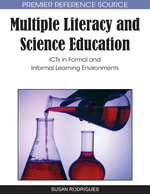 Zusammenfassungen
Zusammenfassungen
 Although the field of informal learning has much to contribute to the field of formal learning, these fields appear to be failing to synergize and balance to create the ideal education environment.
Multiple Literacy and Science Education: ICTs in Formal and Informal Learning Environments explores the nature of various learning enlightenment mediums and their consequences within a classroom context to synchronize understanding within the schooling fields. This authoritative collection provides an overview of current research, practices, and evidence-based approaches regarding further development for best practices of multiple literacy teaching atmospheres.
Although the field of informal learning has much to contribute to the field of formal learning, these fields appear to be failing to synergize and balance to create the ideal education environment.
Multiple Literacy and Science Education: ICTs in Formal and Informal Learning Environments explores the nature of various learning enlightenment mediums and their consequences within a classroom context to synchronize understanding within the schooling fields. This authoritative collection provides an overview of current research, practices, and evidence-based approaches regarding further development for best practices of multiple literacy teaching atmospheres. Kapitel
Kapitel 
- A Conversation Between Colleagues - Defining Multiple Literacy in Science Education (Seite 1 - 10) (Colette Fortuna, Sheila Henderson, Joseph McLuckie, Susan Rodrigues, Lorraine Syme-Smith, Neil Taylor, Graham Williamson)


- Empowering Students to be Scientifically Literate through Digital Literacy (Seite 11 - 31) (Wan Ng)


- Achieving Multiple Literacy in Science Education - A Classroom Teacher’s Perspective (Seite 32 - 48) (Sinclair Mackenzie)


- Using Multimedia Learning Aids from the Internet for Teaching Chemistry - Not as Easy as it Seems? (Seite 49 - 69) (Ingo Eilks, Torsten Witteck, Verena Pietzner)


- Three Primary Science Podcasts - Illustrating the Contextual and Staging Dimensions of Language in Podcasts (Seite 70 - 83) (Susan Rodrigues, Graham Williamson)


- Diffusion of ICT Innovation in Science Education (Seite 84 - 102) (Bulent Cavas, Pinar Cavas, Bahar Karaoglan, Tarik Kisla)


- The Role of ICTs in Primary Science Education in Developing a Community of Learners to Enhance Scientific Literacy (Seite 103 - 122) (Beverley Jane, Marilyn Fleer, John Gipps)


- Multiple Literacies and Environmental Science Education - Information Communication Technologies in Formal and Informal Learning Environments (Seite 123 - 141) (Ruth Hickey, Hilary Whitehouse)


- Enhancing ICT Application in Science and Mathematics Education - The Malaysian Smart School Experience (Seite 142 - 164) (Suan Yoong, Lee Yuen Lew)


- AVU’s Experience in Increasing Access to Quality Higher Education through e-Learning in Sub-Saharan Africa (Seite 165 - 179) (Bakary Diallo, Sidiki Traoré, Therrezinha Fernandes)


- Multiple Literacies in the ICT Age - Implications for Teachers and Teacher Educators, an Australian Perspective (Seite 180 - 206) (Heather Fehring)


- Online Assessment - Informing Practice in Tertiary Science Education (Seite 207 - 224) (David Walker)


- Enhancing Scientific Literacy through the Industry Site Visit (Seite 225 - 239) (Jari Lavonen, Antti Laherto, Anni Loukomies, Kalle Juuti, Minkee Kim, Jarkko Lampiselkä, Veijo Meisalo)


- The Networked Pupil and the Vanishing Paper Trail - A Re-Culturing of the Learning Process in the 21st Century (Seite 240 - 248) (Andrew Marks)


- Learning, Old Age and Email (Seite 249 - 262) (John S. Murnane)


- Virtual Worlds for Science Learning (Seite 263 - 279) (Mick Grimley, Trond Nilsen, Roslyn Kerr, Richard Green, David Thompson)


- Representational Inquiry Competences in Science Games (Seite 280 - 297) (Rikke Magnussen)


 Dieses Buch erwähnt ...
Dieses Buch erwähnt ...
 Dieses Buch erwähnt vermutlich nicht ...
Dieses Buch erwähnt vermutlich nicht ... 
 Nicht erwähnte Begriffe | Universität |
 Volltext dieses Dokuments
Volltext dieses Dokuments
 Bibliographisches
Bibliographisches 
 Beat und dieses Buch
Beat und dieses Buch
Beat hat dieses Buch während seiner Zeit am Institut für Medien und Schule (IMS) ins Biblionetz aufgenommen. Beat besitzt kein physisches, aber ein digitales Exemplar. Eine digitale Version ist auf dem Internet verfügbar (s.o.).











 Edmodo
Edmodo Hochschule
Hochschule Problemlösefähigkeit
Problemlösefähigkeit Turnitin
Turnitin , 244 kByte;
, 244 kByte;  Link unterbrochen? Letzte Überprüfung: 2021-03-21 Letzte erfolgreiche Überprüfung: 2015-02-28)
Link unterbrochen? Letzte Überprüfung: 2021-03-21 Letzte erfolgreiche Überprüfung: 2015-02-28) 

 Biblionetz-History
Biblionetz-History